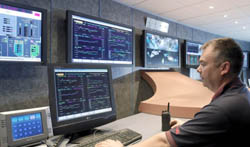
Posted to News on 20th Feb 2007, 15:16
ABB control system improves Corus blast furnace
ABB has installed a new control system at Corus' Scunthorpe Steel works, leading to improved process visibility and flexibility.

A new ABB control system for the Queen Victoria blast furnace at Corus' Scunthorpe Steel works is providing the company with improved visibility of the iron making process and greater flexibility in the way steel is produced.
The new ABB System 800xA for Queen Victoria includes two Advant controllers, six operator consoles and two parallel information reporting workstations. A total of 2500 I/O are handled by ABB S800 modules, together with a link to the earlier S100 units. As a vital part of the contract, ABB is also supplying hopper load cells and seven Millmate MC400W weigher panels for use in the stock house and for control in furnace burdening. Batching is controlled by 99 independent recipes, constructed by the furnace operator, each consisting of up to seven separate materials in a batch. These recipes can be loaded from disk and used to burden the furnace appropriately.
The installation architecture was jointly designed by ABB and Corus, with this task made easier through the good long-standing relationship between Corus and ABB project engineers. ABB had provided a core team of highly experienced engineers who had worked on other Scunthorpe blast furnaces over the previous 25 years. This continuity of dialogue helped to fast-track the design and development phases and keep the commissioning and start-up time to a minimum. As a result, there was a rapid ramp-up to full production at the right quality.
Thorough testing
Once the design had been finalised in close consultation with Corus, ABB started building the system at its facility in St Neots. Corus stipulated the need to test the complete system before it left the ABB factory. Corus spent eight weeks testing the control suite with bespoke simulation software, written by ABB engineers, thereby satisfying themselves that it would work as specified with its existing systems.
Corus control engineer Spencer Pullin comments: "We have had a very good relationship with ABB throughout the last 20 years and this project was another example of 'Best Supplier to Best Customer' in action. The ability to test at the ABB factory was very useful. Commissioning would have been more critical if it had all been done on site. This way we eliminated any risk of lost production and ensured a very quick ramp-up time."
Following testing, the completed system was taken to site and set up in a separate training area to familiarise the operators with the new operator interface. The wisdom of choosing a vendor to maintain commonality with the previous system paid off, as the operators were able to get up to speed on the system much more quickly than they would with something completely new. Pullin comments: "The operators' interface has been kept very similar to that of the previous ABB control system, making it easy for the operators to learn."
Improved reporting
Another major benefit of the new system is the improved management reporting. All data from the controller is made readily available to management staff, making it easier for them to have overall control of the blast furnace. Reports are archived within the system and can be recalled by an operator at any time. Importantly, and to satisfy current legislation, real-time events and alarms are displayed locally for the operator and engineer. Each day these records are archived and can be recalled at any time in the future for historical analysis.
The system also provides more redundancy, allowing Corus to ride through minor equipment issues without losing production. Pullin says: "ABB delivers extremely good reliability from its control systems. We have never had to take a plant out of production due to a problem with ABB equipment since we changed over to using ABB control systems."
All of the hardware and cabling for the system was installed during the outage for replacing the furnace refractories. Commissioning followed on from this. Pullin states: "After installation, we simply switched on the control system and got going. It all went successfully. The system has been in operation for three months now and has performed flawlessly."
One of the novel features of the project was a permanent landline installed to enable ABB engineers at St Neots to interrogate the system remotely and monitor the performance of the systems during the early phases of the furnace fill and after the lighting of the blast furnace.
Neil Baldwin, project manager for ABB says: "The project went well because of the close co-operation between the two companies. We both got benefits from it – Corus got the highly reliable and flexible system they wanted and we improved and strengthened our relationship with an important and valued customer."
Want the latest machine building news straight to your inbox? Become a MachineBuilding member for free today >>
ABB Automation Technologies (Instrumentation & Automation)
Howard Road
Eaton Socon
PE19 8EU
UNITED KINGDOM
+44 (0)1480 475 321

















